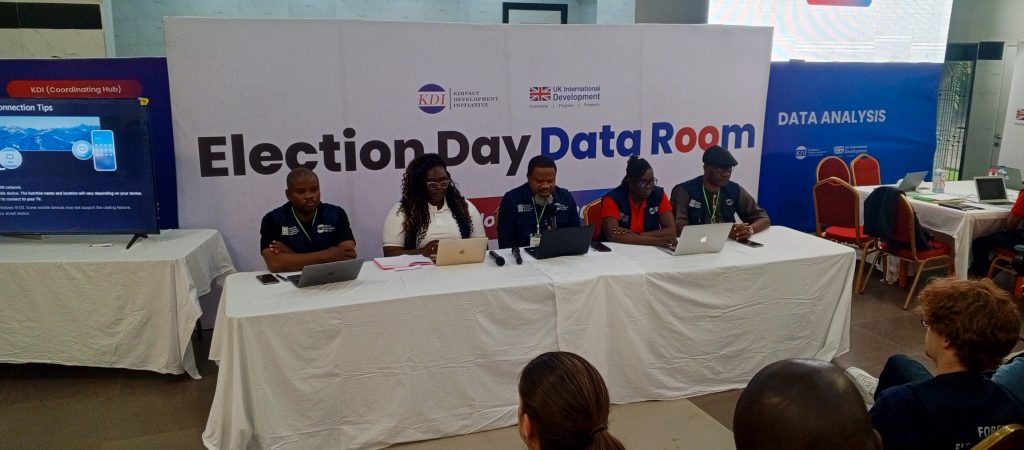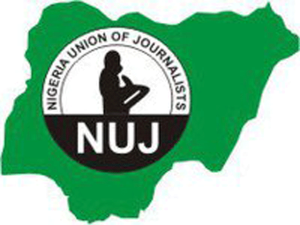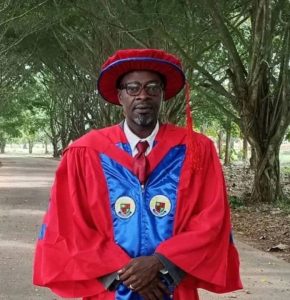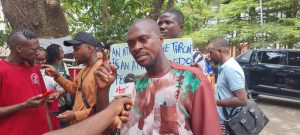
One of the leading and credible Non-governmental organisation in Nigeria, Kimpact Development Initiative (KDI), has called on Independent National Electoral Commission (INEC) to ensure all voters on the voting queue vote before the closing of the poll.
KDI said the electoral umpire should ensure adequate measures are in place in case voting entered into late hours (night).
The said security agencies should be on top gear as the process move into the second part of the process which will involve vote sorting and counting to remain professional and discharge their duties without fear or favour.
According to the NGO in their immediate press release on Saturday afternoon read by Chief Chris Isiguzor, Presiden, Nigeria Union of Journalists, NUJ; INEC should identify those areas that experienced delay due to the heavy downpour. Citizens should be encouraged to exercise their rights freely and fairly for the benefit and integrity of our democracy.
“We call on security agencies to critically investigate any forms of vote buying and selling, to further deter the likelihood of violence that could interrupt the free flow of voting.
KDI also commended the commitment of the National Youth Services Corp (NYSC) members and other Ad-hoc staff who continue to play a crucial role in upholding democracy in Nigeria.
“We remain committed to advocating for a transparent electoral process and will continue to monitor developments as the day progresses the statement added.
The NGO listed the following points
POTENTIAL FOR VIOLENCE.
- Logistical Challenges for INEC Officials: Logistical issues continue to impact the electoral process. We noted delays in the deployment of INEC ad-hoc officials in some RACs to polling units, raising questions about what went wrong.
It was rightly observed in RACs, such as Agbado Primary School, Akpapava Road, Oredo LGA and Model Primary School, close to Stella Obasanjo Hospital Ikpoba Okha LGA that limited vehicles were available. Some of these vehicles were rickety and inadequate, forcing officials to be transported in multiple trips. By 9:30 am, some officials had still not left their RAC centers, which resulted in late commencement of poll in affected areas.
Addressing these questions is vital for ensuring a smoother electoral process in the future. These logistical gaps not only disrupt the election process but also create opportunities for misinformation, as anxious voters may wrongly assume that election materials or officials have been compromised. It is imperative that both INEC and NURTW collaborate effectively to prevent such disruptions and ensure a seamless election process. - Late Arrival of Election Materials: KDI field observers reported significant delays in the arrival of election materials and the commencement of voting at some polling units. Observations indicate that election officials arrived at polling stations between 8:30 am and 9:30 am, with voting commencing between 9:00 am and 10:30 am. While the late deployment of election officials and materials from RACs contributed to these delays, it was compounded by a heavy downpour, which further disrupted the process. In Esan West, Esan Southeast, and Owan West, heavy rainfall in the early hours of the day delayed both the arrival of INEC officials and the participation of voters, many of whom were forced to seek shelter from the rain. In riverine areas, crossing to polling units was also hindered by the adverse weather conditions, preventing timely access. Additionally, we observed that voting in Urhonigbe South, Orhiomwon Local Government Area, was further delayed due to the non-availability of result sheets, which prevented the polls from commencing on time. These logistical and weather-related challenges underscore the need for better contingency planning to ensure the timely start of elections, regardless of external factors
- Security Concerns: Security personnel seemed to have a high presence in the state, assuring citizens of a peaceful process, these also include the presence of NDLEA, the military, and the Nigeria Security Civil Defence Corps (NSCDC). However, there was a lack of security personnel available to accompany INEC staff in Oredo, which raised concerns about the protection of ballot boxes. These are some of the instances that can lead to violence.
- Weather-related transportation Issues: KDI field observers reported rainfall in some areas around Egor, Oredo, Igueben, Ovia Southeast, Uhunmwnde, Owan Esan Central, Esan Northeast, and Etsako Central. The weather hindered boat transportation to riverine areas and delayed INEC staff, further complicating the delivery of materials and delaying the opening of polling units. Recall that KDI’s pre-election security risk assessment report (ESRA) had brought to the attention of INEC of the probability of 4 – 5 hours of rain on election day.
- Vote buying/selling: The political class in Nigeria continues to evolve strategies for vote buying a practice that has become increasingly prominent in the country’s elections. KDI’s Election Day Data Room received multiple reports of vote buying across all three senatorial districts in Edo State during the governorship election. In several local government areas, vote buying was more of systemic than open transactions – nevertheless, there were cases of open exchange of votes for cash and material goods, with sums ranging from N1,000 to N10,000. In some instances, voters were observed entering shops that appeared to be conducting regular business; however, the large number of voters visiting these shops suggested otherwise. Our observers also witnessed instances where party agents and voters engaged in electronic money transfers, further indicating the ongoing prevalence of vote buying during the election. This disturbing trend underscores the need for more stringent measures to curb vote buying and ensure the integrity of the electoral process. In Ikpo-okpha and Egor, the military and DSS were brought in to conduct investigations into the allegations of vote buying.





